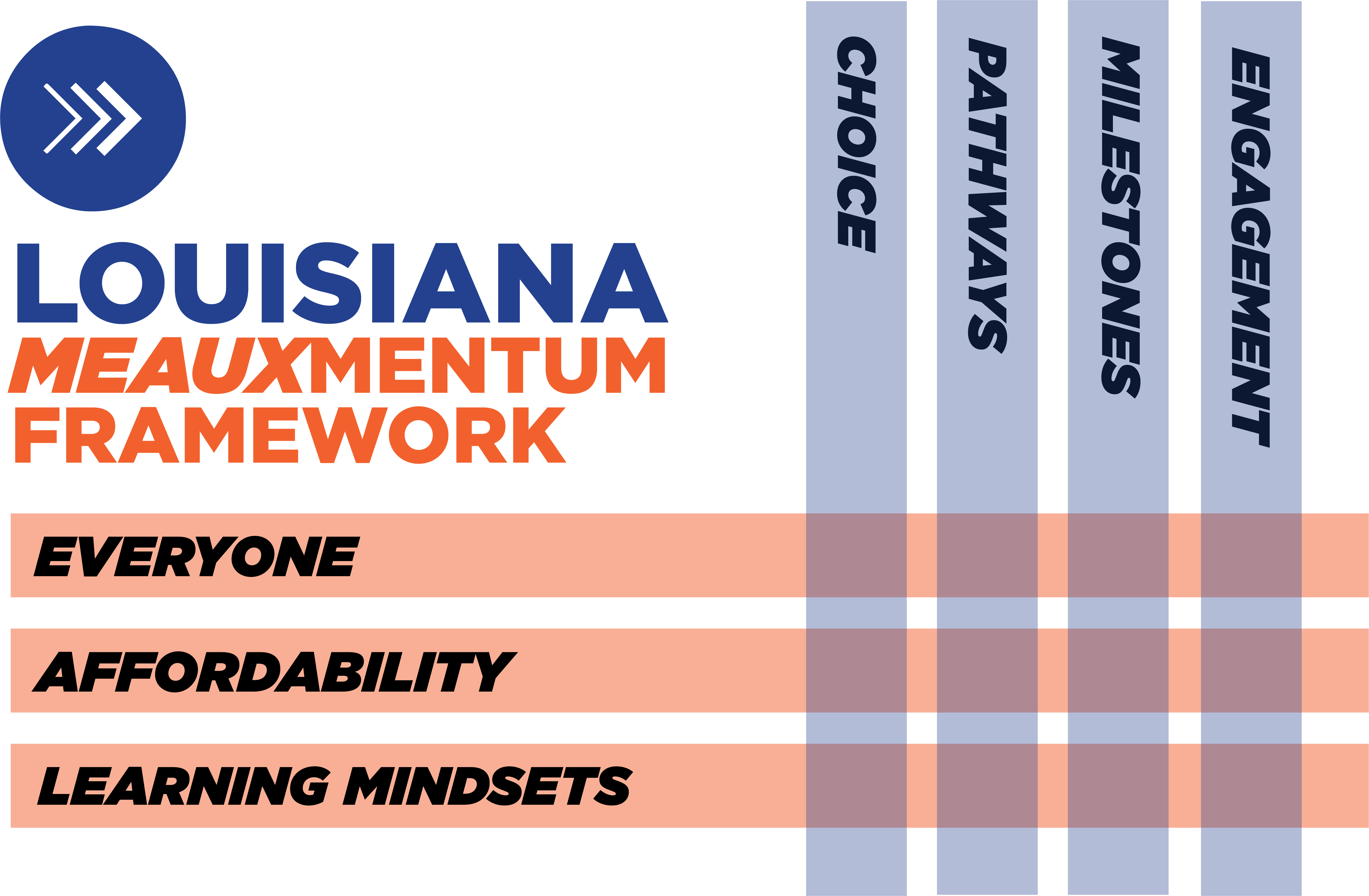
The Louisiana Meauxmentum Summit and the Momentum Approach
Over the last decade, the focus has grown on strategies to not only improve access to higher education but also promote the successful completion of credentials of value and the use of those credentials to build productive lives and work. These efforts have ranged from introducing new classroom pedagogy approaches to the creation of new models of higher education. Experts have studied what works in systems of higher education and conversely, what does not; have attempted to diagnose the root causes of inequity in higher education, and how they can be removed; and have sought to identify the barriers we have historically and often unknowingly placed in the way of our students’ successes, and how we might take student achievements to new heights. The combination of this work has resulted in The Momentum Approach, an evidence-based framework demonstrated to significantly improve student success and close equity gaps across all types of universities and colleges in multiple states.
The Louisiana Meauxmentum Summit brought together leadership teams from all 28 of the state’s public undergraduate institutions of higher education for intensive discussions focused on how The Momentum Approach can be comprehensively applied on their campuses. National experts will provide support and resources to help each institution create an action plan based around The Momentum Approach, to be used as they progress along the Pathway to 2030, toward reaching the goals of the state’s higher education master plan, Louisiana Prospers.
The Momentum Approach applies a design framework combining three foundational strands and four structural threads. Together they create a theory of change that can be applied across the length, breadth, and depth of higher education, within the context of an institution, program, or classroom. The Louisiana Meauxmentum Summit concentrated on applying these ideas at the institutional level, building on the work of the campuses to create implementation plans to enact all four threads by Fall 2024.
Foundational Strands
These components of the student experience are critical to ensuring all students are afforded the opportunity and environment they need to thrive. The “foundational strands” should be woven through policy, organizational structures, and strategic plans aimed at student success. The following questions are intended to provide guiding principles for each strand:
-
-
-
- Everyone: How does the campus community reflect and respect the diverse needs of students? How does the campus ensure racial and socioeconomic equity for all students? How does the institution, including all academic and support units, ensure equitable access to each program of study and facilitate student success in all programs?
- Affordability: How does the campus community create an environment that is cognizant of access to resources and the non-academic factors that often shape students’ college experiences? How does the institution provide multifaceted and comprehensive support to overcome barriers that non-academic factors or resource gaps might otherwise create?
- Learning Mindsets: How does the campus community ensure that students find purpose and value in their academic studies, create a sense of belonging and inclusion for all students, and cultivate a growth mindset approach to learning?
-
-
Structural Threads
The structural threads are the primary policy and process drivers of The Momentum Approach. Proven strategies that address these four critical areas of a student’s experience will improve student success. While the initial focus is on a student’s academic experience, these principles can be applied to other critical areas of the student experience, such as financial aid, student life, or career services.
Differing institutions may well be at different implementation stages across each of the threads. It might be helpful, initially, to take stock of the programs that are currently being implemented, and then use The Momentum Approach to explore ways in which they might be improved, enhanced, or connected. Evidence and research show that student outcomes can be significantly impacted by implementing the stages of the Framework in order. Consequently, in each thread institutions should concentrate their planning efforts on ways to supplement their current work with ideas from the next un-implemented stage. Campuses will be provided with Momentum Framework data as part of the Summit materials.
Choices: What are the critical choices that students need to make throughout their educational journeys and how should those decision points be built into institutional structures and processes?
Stage 1: Create and implement policies, processes, and practices to build a choice architecture (choice process designed to guide students through the decision process) that enables students to make a purposeful program or focus area choice as soon as possible. Ensure that the student’s decision is informed by career advising and that all students are supported in choosing a specific program of study by the end of their first academic year.
Stage 2: Create and implement policies, processes, and practices that ensure a holistic advising experience for all students throughout the educational journey, from orientation to graduation and employment. Advising should draw together the threads and strands of The Momentum Approach and Meauxmentum Pathways.
Stage 3: Begin establishing the Choices Thread more broadly by creating choice-based initiatives in other aspects of college life, such as financial aid or student life.
Pathways: How are students’ educational journeys designed, both inside and outside the classroom, to enable them to earn credentials aligned with their academic goals and to adequately prepare them for a career in their chosen field with minimal roadblocks and few excess credits, as well as ineffective time frames? How does the design of these pathways align with enacting the students’ critical choices?
Stage 1: Create and implement policies, processes, and practices to implement Meauxmentum Pathways.
Stage 2: Appropriately utilize Predictive Analytic approaches to monitor progress along educational pathways. Institutions should, for instance, be able to know when a student is within 30 hours of graduation, and what needs to be provided to enable completion.
Stage 3: Begin establishing the Pathways Thread more broadly by creating pathways-based initiatives in other aspects of college life, such as financial aid, student life, or career planning.
Milestones: How are institutions identifying curricular and co-curricular milestones across the entire student experience, to monitor and ensure effective progress along students’ educational journeys?
Stage 1: Create and implement policies, processes, and practices that enable every student to complete within their first academic year a required general education English course and a general education math course that connects to their discipline. Align this work with the implementation of corequisite remediation.
Stage 2: Identify catapult courses for which data indicate that success in the course leads to increased programmatic success. Put in place course redesigns to improve outcomes in the catapult courses that have the greatest impact.
Stage 3: Begin establishing the Milestones Thread more broadly by creating milestone-based initiatives in other aspects of college life, such as financial aid, student life, or career planning.
Engagement: How are institutions designing educational experiences that deepen students’ engagement with their declared program of study and ensure students are appropriately prepared for life, citizenship, and work in their chosen field?
Stage 1: Create and implement the policies, processes, and practices that enable every student to attempt in their first academic year at least three courses that directly connect them with their program or focus area.
Stage 2: Create the policies, processes, and practices that facilitate the incorporation of High Impact Practices into students’ curricular and extracurricular experiences.
Stage 3: Begin establishing the Engagement Thread more broadly by creating engagement-based initiatives in other aspects of college life, such as financial aid, student life, or career planning.
